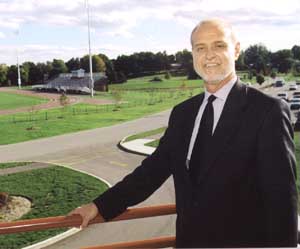
president looks to build on school's recent successes It has been nearly six months since John A. Martin assumed the helm at Roberts Wesleyan College following 20 years of a heralded presidency by William Crothers. Following two decades of amazing growth and prosperity at the local Christian college, maybe the best compliment available for Martin would be that things don't change. However, that isn't stunting Martin's enthusiasm or dashing his confidence. With a great deal of experience under his belt, Martin talks of continuing to foster growth at Roberts and beginning to intensify the college's focus on the quality of its academics. "I think there is a huge market for the type of school we are," said Martin. "Our passion is not just to grow ... we want to grow strategically." In the last nine years, Roberts' enrollment has almost doubled and the school is on the verge of 2,000 students - far above what they had projected. Roberts Wesleyan has also grown physically with the addition of many facility upgrades. The college is currently planning to build its state-of-the-art Golisano Library. Recently, the college added a new eight-lane, Olympic-quality track and lighted soccer stadium. Roberts has also built an addition on its dining commons, constructed a new administration building, renovated the old administrative building to house the Northeastern Seminary and added a 200-bed dormitory. The college celebrated Martin's Presidential Inauguration, October 4, but it wasn't a welcoming party, as he began working at Roberts in 1996 as a senior vice president and provost, and became the executive vice president for both the college and the seminary in 2000. Martin's previous career involved teaching in the classroom and serving in other leadership capacities. Before coming to Roberts, Martin served as president of Central College in McPherson, Kansas from 1990 to 1996. He also served as a professor and then dean of faculty at Dallas Theological Seminary from 1977 to 1990. With this background, Martin is eager to work to improve Roberts academic offerings. "Earlier on in life I was a professor and loved teaching," said Martin. "Now my teaching is more one on one with those I work with." Colleague and friend Burton Jones, vice president for Academic Administration, said continuing to improve the school's academic integrity is a complicated undertaking, but one for which Martin is uniquely qualified. Jones said increasing the academic stature of the college and seminary is a complex and multifaceted matter involving such things as:
In recent years, Roberts has evolved into a more comprehensive institution offering non-traditional and graduate programs in addition to the liberal arts programs. More than 40 liberal arts, professional and pre-professional bachelor programs are offered. At the graduate level, Roberts Wesleyan offers the Master of Education, the Master of Social Work, the Master of Science in Management degrees, and, as of this year, the MS and MA in Psychology. Roberts was recently named one of the country's "Best Values" for universities in the Northern United States, according to a new list by U.S. News & World Report. Martin said this award affirms the hard work on the part of the college and is recognition of the increased magnitude of Roberts' academic offerings. "We are now classified as a university, even though we don't use that name," said Martin. "We are a comprehensive college functioning like a small urban university." Martin said he is also focused on becoming "the college of the community." Nice, new facilities and new cultural programs will hopefully bring more Rochesterians to campus. The college has already formed some strong working relationships with the area's other academic institutions and with local businesses. Martin said part of his focus is on continuing to enhance these relationships for the betterment of the college's academic programs. Martin also said he is excited about the tasks ahead and thankful for where he is. "There are always options out there, but I wanted to be somewhere where I can make a difference like this," said Martin. "We have serious students who like the type of education we deliver and we have serious faculty who enjoy teaching and advancing the institution." The Roberts Revolution (Information provided by Burton Jones) |
